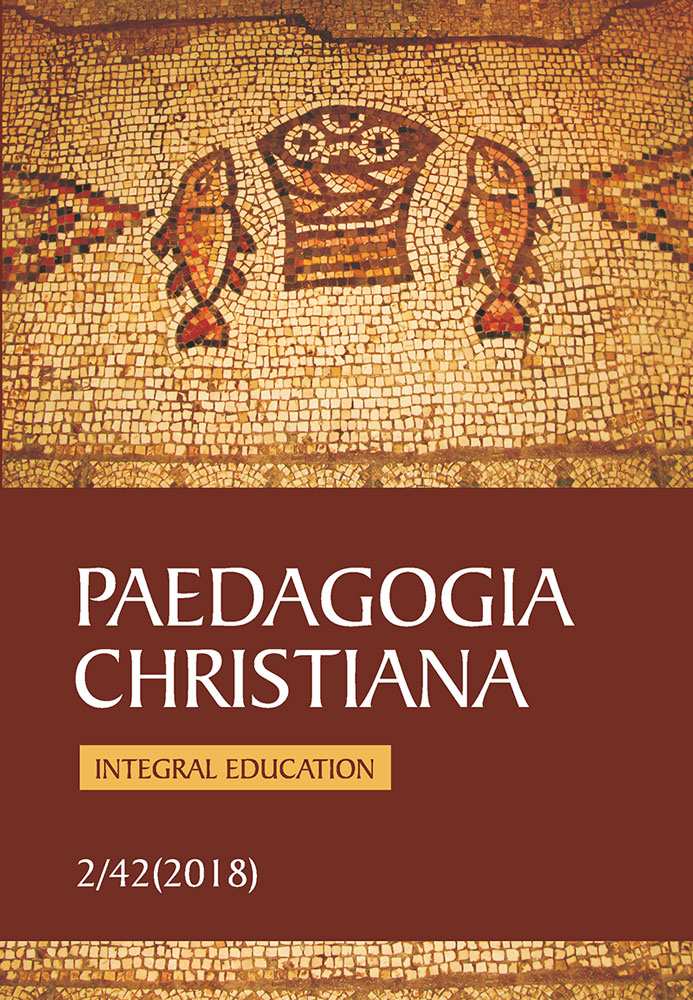Role and Meaning of Formation in Teacher Integral Development
DOI:
https://doi.org/10.12775/PCh.2018.022Keywords
person, teacher, integral upbringing, integral development, formationAbstract
The article is aimed at presenting the role and meaning of formation in teacher integral development. Formation can be treated as one of the fundamental pedagogical categories supporting the effective educational processes. It is tightly connected with integral upbringing. The key point in formation is the person’s interior where the whole process starts. It needs a strong person’s commitment to it. However, an individual should, first of all, understand the whole concept of formation paying attention to spirituality which is the source of any activities determined axiologically. In particular, educators dealing with teacher education cannot neglect such crucial factors seen from three dimensions: personal, pedagogical and professional. Considering the fact that the matters connected with teacher formation are not often undertaken, the theme of article seems justified. Hence, the method used in the article is the analysis of gathered material that bears some of the implications included in the conclusion.
References
Adamski, Franciszek. „Wprowadzenie: personalizm – filozoficzny nurt myślenia o człowieku i wychowaniu”. W: Wychowanie personalistyczne, red. Franciszek Adamski, 9–19. Kraków: WAM, 2005.
Bolzan, Doris Pires Vargas, Isaia Silvia Maria de Aguiar, Maciel Adriana Moreira da Rocha. “Teacher’s formation: the construction of teaching and pedagogical activity in Higher Education”. Rev. Diálogo Educ 38 (2013): 49–68.
Cencini, Amedeo. Od wychowania do formacji. Kraków: Salwator, 2005.
Chałas, Krystyna. „Introcepcja wartości”. W: Encyklopedia Aksjologii Pedagogicznej, red. Krystyna Chałas, Adam Maj, 460–464. Radom: POLWEN, 2016.
Gerstmann, Stanisław. Rozwój uczuć. Warszawa: WSiP,1986.
Granat, Wincenty. Osoba ludzka. Próba definicji. Lublin: Wydawnictwo KUL, 2006.
Jan Paweł II. Przemówienia. Homilie. Polska 2VI–10VI 1979. Kraków: Znak, 1979.
Kunowski, Stefan. Podstawy współczesnej pedagogiki. Warszawa: Wydawnictwo Salezjańskie, 2000.
Kunowski, Stefan. Wartości w procesie wychowania. Kraków: Impuls, 2003.
Marek, Zbigniew. Pedagogika towarzyszenia. Kraków: AIK, 2017.
Nesbit, Marion, Susan DeCristofaro. “Creative Arts as Companion Therapy in Cancer Treatment: A Patient Partnership”. Journal of Pedagogy, Pluralism, and Practice 4 (2007): 81–90.
Nowak, Marian. Podstawy pedagogiki otwartej. Ujęcie dynamiczne w inspiracji chrześcijańskiej. Lublin: RW KUL, 2001.
Palmer, Parker. “Reflections on a Program for The Formation of Teachers. An occasional paper of the Fetzer Institute”, http://www.couragerenewal.org/parker/writings/reflections-on-a-program/ [access: 10.06.2016]
Paszkowska, Teresa. „Formacja osoby”. W: Encyklopedia Aksjologii Pedagogicznej, red. Krystyna Chałas, Adam Maj, 368–372. Radom: POLWEN, 2016.
Rusiecki, Mieczysław. „Religijność a dojrzałość osobowa człowieka (wyzwanie dla polskiego nauczyciela na III tysiąclecie”. W: Kształcenie kandydatów na nauczycieli. Teoria – praktyka, red. Teresa Gumuła, Tadeusz Dyrda, 61–83. Kielce: UHP, 2006.
Rynio, Alina. Integralne wychowanie w myśli Jana Pawła II. Lublin: Wydawnictwo KUL, 2004.
Rynio, Alina. „Integralny rozwój człowieka”. W: Encyklopedia Aksjologii Pedagogicznej, red. Krystyna Chałas, Adam Maj, 448–453. Radom: POLWEN, 2016.
Rynio, Alina. „Integralne wychowanie”. W: Encyklopedia Aksjologii Pedagogicznej, red. Krystyna Chałas, Adam Maj, 440–448. Radom: POLWEN, 2016.
Sroczyński, Wojciech. „Rozwój człowieka”. W: Encyklopedia Aksjologii Pedagogicznej, red. Krystyna Chałas, Adam Maj, 971–981. Radom: POLWEN, 2016.
Szymańska, Maria. Transformative creativity in teacher formation. A pedagogical approach. Kraków: Wydawnictwo Akademii Ignatianum, WAM, 2017.
Szymańska, Maria. „Introcepcja wartości w kształtowaniu dojrzałości ludzkiej podmiotów edukacyjnych. Perspektywa pedagogiczna”. W: Człowiek – edukacja – społeczeństwo. Wybrane zagadnienia i problemy, red. Małgorzata Gogolewska-Tośka, Maria Szymańska, 51–63. Pułtusk: Akademia Humanistyczna im. Aleksandra Gieysztora, 2017.
Veiga, Ilma Passos Alencastro. “Teachers’ formation for Higher Education and the diversity in the docence/teaching”. Rev. Diálogo Educ. 42 (2001): 327–342.
Wierzbicki, Alfred. „Osoba”. W: Encyklopedia Aksjologii Pedagogicznej, red. Krystyna Chałas, Adam Maj, 694–697. Radom: POLWEN, 2016.
Downloads
Published
How to Cite
Issue
Section
Stats
Number of views and downloads: 689
Number of citations: 0



